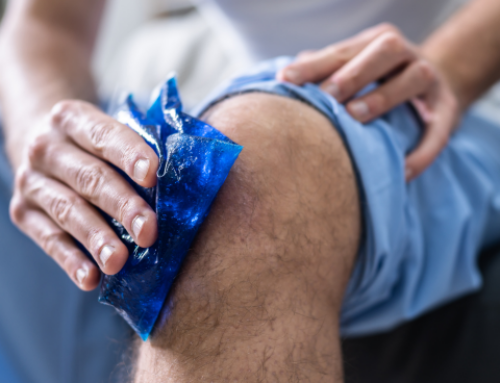How to Maintain Strength and Muscle When You’re Injured
There is nothing more frustrating for an athlete than being out with an injury and suffering the costs of detraining. The frustration comes from many sources. You feel bored because you can no longer devote time to training. You miss the release you get from doing the sport you love. But most important, you wonder how much of your hard work will go to waste as you recover.
For many athletes, this frustration can lead to poor decisions. Too many athletes are mentally ready to get back in the gym long before they are physically ready to begin training again. Desperate not to lose their competitive edge, they would rather risk a little extra pain than have to go through all the hard work a second time.
RELATED: Paul George Discusses the Struggles of His Injury Recovery
Detraining is a problem when you get injured. But it’s almost never as bad as it feels in your head. It may seem like you’re weak and feeble overnight. But a true loss of fitness takes time, and you won’t suffer from missing only a few training sessions.
Power and flexibility can decrease after a week of inactivity. Endurance may suffer after a few weeks. But your general strength levels can be maintained even after a month of rest. Even after a year of sitting out, you can still maintain a decent portion of your general strength and avoid detraining. Plus, the fitter you are, the further you have to fall. This is good news for veteran athletes with a superb base level of fitness.
One of the best things you can do to keep your strength up when you’re injured is to focus on nutrition. All the negative emotions that come with injury can lead athletes to neglect their healthy diet and take up bad habits. After all, if you’re not training every day, why shouldn’t you eat pizza for breakfast? Nutrition is definitely underrated when you are injured. A great diet will help you feel better mentally and physically. In fact, nutrition is one of the keys to healing faster. Many vitamins and minerals aid tissue repair.
RELATED: Returning to Football After an ACL Injury: The Adrian Peterson Way
Avoid gravitating toward comfort foods during your recovery. Foods like white flour, potatoes, eggplant and peppers have inflammatory effects that are bad for your body and can accelerate detraining.
Plus, if you make a sudden shift to a carb-heavy diet, you are likely to feel adverse consequences on your energy levels almost immediately.
Second, you need to stay active to avoid detraining. Staying active to the best of your ability is one of the best things you can do to prevent or slow down deconditioning. Do not start eating your meals in bed. Get up and walk around your house as much as possible.
If you are on bedrest, there are small exercises you can do to keep your muscles active.
If you’re not on bedrest, consider training around your injury whenever possible. If you are a runner who is out with a knee injury, try cycling, yoga or swimming if it’s OK with your doctor.
RELATED: Life After CrossFit: Julie Foucher Discusses Her Injury Recovery
If your injury affects only one muscle group or area of the body, you may be able to train around the injury by working the muscles that are unaffected by the injury. For example, if you have a ruptured tendon in one leg, you can train the opposite leg, which coincidentally actually helps you maintain muscle strength in the injured leg to an extent. You can also train your arms and your back. In most cases, this will have little effect on the injury itself and allow you to keep going in the gym.
It is important to remember that there’s no best approach for returning to training. How you get back in the game depends on your base level of fitness, the extent of your injury and the urgency involved in your return.
At the end of the day, it’s important to keep yourself emotionally healthy. And the best way to do that is to change as little of your routine as possible. Continue to eat a healthy balanced diet to promote general health and encourage the healing process. Get plenty of sleep, which also helps your body heal.
Remember that injuries are only temporary. As long as you treat them with respect, you can recover fully and regain your fitness in no time.
[cf]skyword_tracking_tag[/cf]RECOMMENDED FOR YOU
MOST POPULAR
How to Maintain Strength and Muscle When You’re Injured
There is nothing more frustrating for an athlete than being out with an injury and suffering the costs of detraining. The frustration comes from many sources. You feel bored because you can no longer devote time to training. You miss the release you get from doing the sport you love. But most important, you wonder how much of your hard work will go to waste as you recover.
For many athletes, this frustration can lead to poor decisions. Too many athletes are mentally ready to get back in the gym long before they are physically ready to begin training again. Desperate not to lose their competitive edge, they would rather risk a little extra pain than have to go through all the hard work a second time.
RELATED: Paul George Discusses the Struggles of His Injury Recovery
Detraining is a problem when you get injured. But it’s almost never as bad as it feels in your head. It may seem like you’re weak and feeble overnight. But a true loss of fitness takes time, and you won’t suffer from missing only a few training sessions.
Power and flexibility can decrease after a week of inactivity. Endurance may suffer after a few weeks. But your general strength levels can be maintained even after a month of rest. Even after a year of sitting out, you can still maintain a decent portion of your general strength and avoid detraining. Plus, the fitter you are, the further you have to fall. This is good news for veteran athletes with a superb base level of fitness.
One of the best things you can do to keep your strength up when you’re injured is to focus on nutrition. All the negative emotions that come with injury can lead athletes to neglect their healthy diet and take up bad habits. After all, if you’re not training every day, why shouldn’t you eat pizza for breakfast? Nutrition is definitely underrated when you are injured. A great diet will help you feel better mentally and physically. In fact, nutrition is one of the keys to healing faster. Many vitamins and minerals aid tissue repair.
RELATED: Returning to Football After an ACL Injury: The Adrian Peterson Way
Avoid gravitating toward comfort foods during your recovery. Foods like white flour, potatoes, eggplant and peppers have inflammatory effects that are bad for your body and can accelerate detraining.
Plus, if you make a sudden shift to a carb-heavy diet, you are likely to feel adverse consequences on your energy levels almost immediately.
Second, you need to stay active to avoid detraining. Staying active to the best of your ability is one of the best things you can do to prevent or slow down deconditioning. Do not start eating your meals in bed. Get up and walk around your house as much as possible.
If you are on bedrest, there are small exercises you can do to keep your muscles active.
If you’re not on bedrest, consider training around your injury whenever possible. If you are a runner who is out with a knee injury, try cycling, yoga or swimming if it’s OK with your doctor.
RELATED: Life After CrossFit: Julie Foucher Discusses Her Injury Recovery
If your injury affects only one muscle group or area of the body, you may be able to train around the injury by working the muscles that are unaffected by the injury. For example, if you have a ruptured tendon in one leg, you can train the opposite leg, which coincidentally actually helps you maintain muscle strength in the injured leg to an extent. You can also train your arms and your back. In most cases, this will have little effect on the injury itself and allow you to keep going in the gym.
It is important to remember that there’s no best approach for returning to training. How you get back in the game depends on your base level of fitness, the extent of your injury and the urgency involved in your return.
At the end of the day, it’s important to keep yourself emotionally healthy. And the best way to do that is to change as little of your routine as possible. Continue to eat a healthy balanced diet to promote general health and encourage the healing process. Get plenty of sleep, which also helps your body heal.
Remember that injuries are only temporary. As long as you treat them with respect, you can recover fully and regain your fitness in no time.













